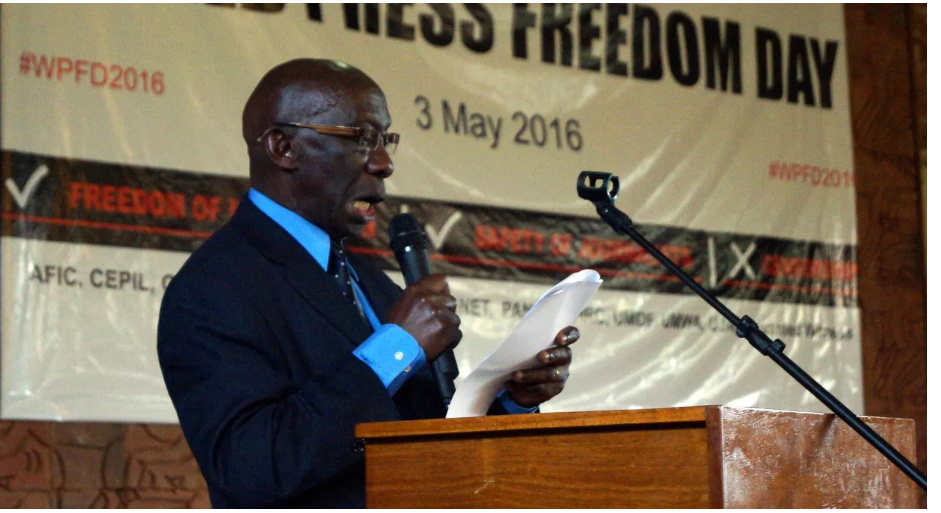
Ugandans on social media attack UHRC boss for supporting internet shutdown during elections
Stephen Kalema
Ugandans on social media have attacked Uganda Human Rights Commission (UHRC) acting chairperson Dr Katebalirwa Amooti for supporting government’s recent move to shutdown the internet during the just concluded general elections.
On 13th January 2020, a day before the 2021 polls, government shut down the internet in the entire country purposely to control any security threats which could have occurred.
While speaking to journalists on Tuesday Amooti said that it was a wise move for the government to shut down the internet.
“It was good because maybe we would have seen a lot of chaos because of the fake news which is always posted on social media,” he said.
However, most people through social media have attacked him alluding that he has ashamed the commission which would have been defending Ugandans against the state which has continuously abused their rights.
Here are some of the comments
Edwin Jessie Bwambale: If these are the people standing for human rights, then Ugandans need to come up with a different plan otherwise, the tyrant has captured all sectors even the religious inclusive.
Tinka Micheal: This country’s population is majorly made up of the youth, such old people should willingly know that they aren’t of any use anymore. Go enjoy your retirement than stating useless observations.
“Is this a human rights director? This is laughable, this old man should be somewhere playing with great-grandchildren, but now he is here suffering on behalf of others. He can’t even know that the purpose of the commission is to defend our rights,” said Moses Ojale.
Doreen Debbie Mirembe: Human rights director does not know the meaning of defending human rights.
Asa Julius said “Why is he still in active service, he needs to retire and let young brain develop the nation. Some people are very selfish.”
Mayanja Emmanuel: What hurts he never came up to talk of the rampant killings of Ugandans but has the courage to talk about the final remarks of the process that was too brutal, full of irregularities no wonder even the doves refused to fly.
Cyen Wafula: This poor man belongs in a museum, he is too old to comprehend what’s currently happening in Uganda.
“Now see what we have as the chairman for human rights when someone is starving in the house and all you have to say is that police has right really? You are useless idiot,” said Naki Grace.
Nyakoojo Silver Araali: When you look at his age you just know that his mind is in analogue. I Don’t think he even has a social media account; such people need to retire because they cannot understand the young generation.
“Imagine the Human Right Commission, which generation is he? These old people need their own gazetted land because they are becoming a big disaster,” Munene Munene.
Human Rights Commission Defends Governments on Internet Shutdown
Hafitha Issa
19 Jan 2021
Uganda Human
Rights Commission has defended the government’s shut down of the internet
during last week’s presidential and parliamentary elections. The Acting Commission
Chairperson Dr. Katebalirwe Amooti Wa Irumba, says government evoked article 43
of the Constitution that provides for limitation of fundamental rights.
Although he distanced himself from the conclusion that the Commission was
justifying the government actions, Dr. Katebalirwe said some opposition members
went into the election to push for regime change in a manner that defeats the
aim of an election. He says security made an assessment that guided the government
decision to shut down the internet, which was done within the law.
Dr. Katebalirwe says the public needs to know that some of
their rights are not absolute and can be suspended for the bigger good like
protecting the country.
Dr. Katebalirwe says a lot happened during the elections including the November
2020 riots that followed the arrest of the National Unity Platform-presidential
candidate, Robert Kyagulanyi. At least 54 people were killed during the
protests that broke out simultaneously in different parts of the country.
Katebalirwe says some sections of the public announced that
they would defy any laws and guidelines set by the Electoral Commission. "In
fact during the campaigns themselves, some people concentrated on using their
time to do defiance and therefore perpetuating conflict with security forces,
sometimes physically. Instead of concentrating on passing the message in
whatever limited way to the electorate ..." said Dr. Katebalirwe.
There has been an argument that the shutdown of internet affected the
credibility of the election since the public couldn't receive and disseminate
as much information as they could through internet platforms. Access to
information Act 2005 gives a right to access, impart and disseminate
information.
Some Civil Society Organizations, the opposition and members of the public, say
the internet shutdown cast doubt on the ability of the Electoral Commission to
deliver a credible free and fair election. Opposition parties like NUP, whose
candidate Robert Kyagulanyi was the first runners up in the elections, had
planned to use their newly launched U-Vote app to monitor elections.
The plan was grossly affected by the internet shut down. Asked
if the shutdown affected the credibility of the Election especially, Dr.
Katebalirwe said he doesn't agree with such reasoning because NUP for instance
still scored high in areas where it was strong.
Dr. Katebalirwe also spoke about the heavy security deployment during the elections. He said while a few people said they had been intimidated to vote due to the deployment, majority felt secure in the presence of security. He says that in places like Kampala people flee in anticipation of violence but that didn't happen.
The Commission however noted that polling materials arrived late at some polling stations, bio metric machines failed to work in some cases, while some staff of the Electoral Commission were not trained well to use the machines. Conclusively, the human rights body says the government was able to deliver a free, fair and peaceful elections.